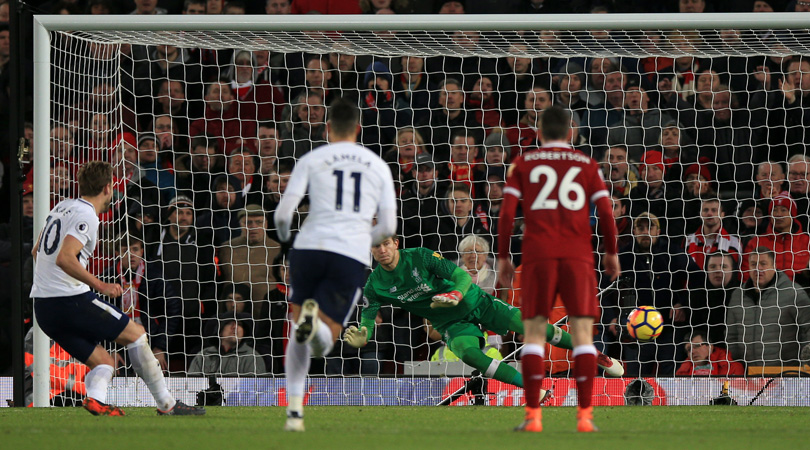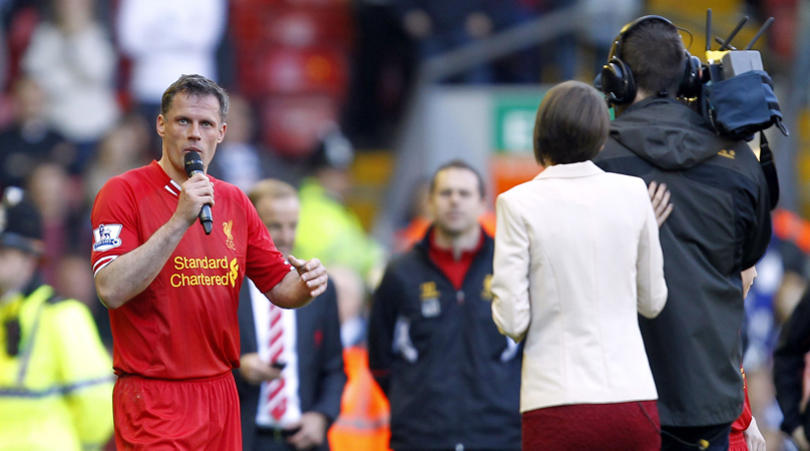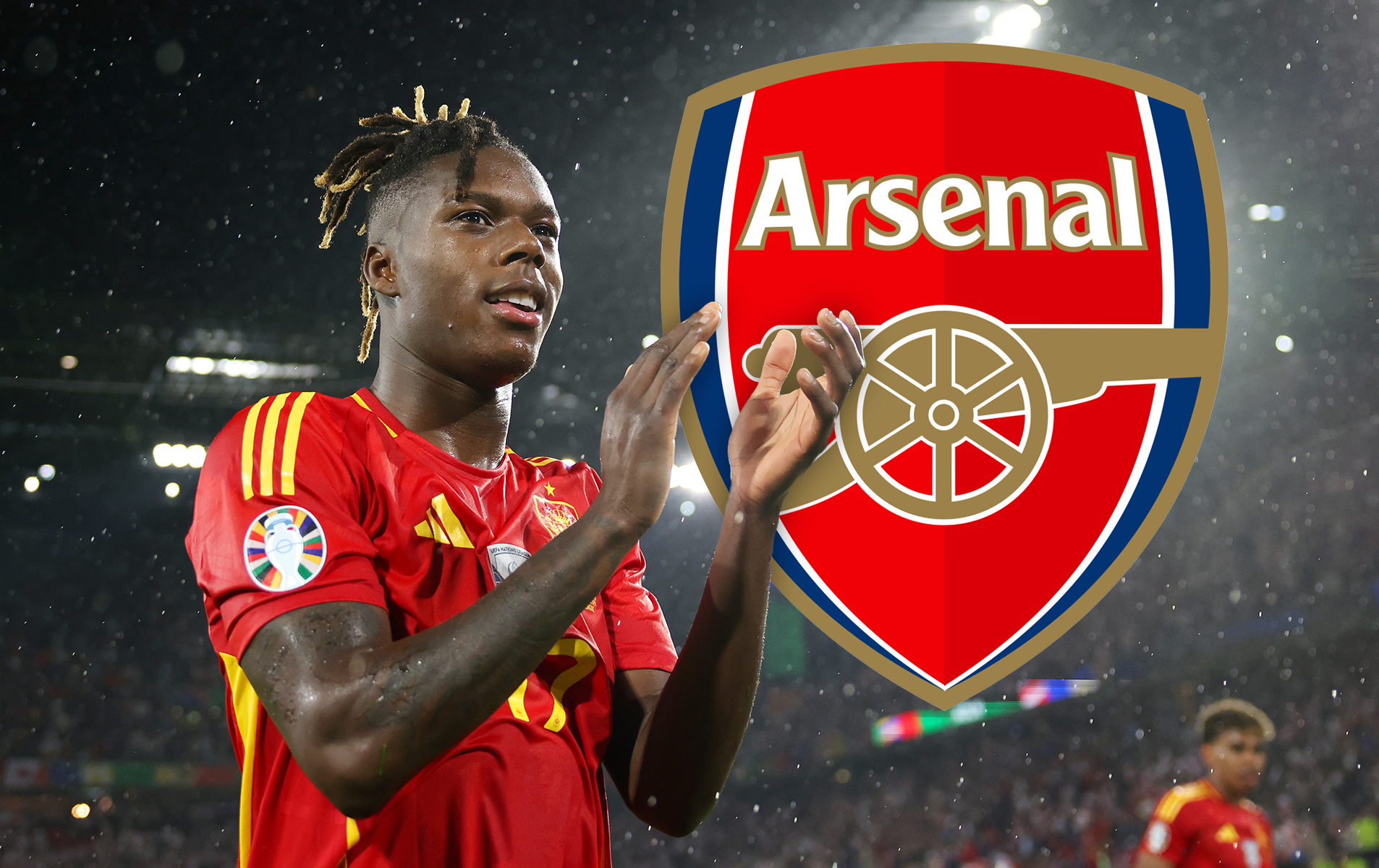11 of the most insane injury times EVER: Bergkamp genius, fight backs and own goals
Mo Salah's brilliance and Harry Kane's balls gave us a finale to remember as Liverpool drew 2-2 with Tottenham. Remember, it ain't over till it's over folks – and these other episodes offer yet more proof

1. Barcelona vs PSG (2016/17)
The most astonishing comeback in modern European football as Barcelona became the first side to overturn a 4-0 first-leg deficit in the Champions League. The Catalans built a 3-0 lead in the second leg, but PSG took back control via Edinson Cavani’s away goal in the second half.
Neymar curled home a free-kick in the 88th minute, but Barça still required two goals to progress as the clock ticked past 90. Cue a controversial penalty earned by (who else?) Luis Suarez, converted by Neymar a minute into injury time. Then – five minutes into an increasingly hectic added time – the Brazilian’s pinpoint cross allowed Sergi Roberto to poke to the ball home and send the Camp Nou wild.
Barcelona progressed and PSG responded in the only respectable way possible: by buying the guy who put them out of the competition for all of the money in the summer. A true fairytale.
2. Barbados vs Grenada (1994)
In this qualifier for the 1994 Caribbean Cup, Barbados needed to win by a two-goal margin in order to qualify for the finals.
However, a new rule tested by the cup’s organisers somewhat complicated things. It stated that a period of 'Golden Goal' extra-time should be used to decide any match that was tied after 90 minutes.
Get FourFourTwo Newsletter
The best features, fun and footballing quizzes, straight to your inbox every week.
Any Golden Goal would count for double – important, given goal difference could help determine the final standings of the group
That might not sound too crazy, until you consider that these were round robin matches, rather than straight knockout. Oh, and any Golden Goal would count for double – important, given goal difference could help determine the final standings of the group.
Barbados had their required 2-0 scoreline until a few minutes from the end, when Grenada pulled one back in the 87th minute. The hosts had to regain their winning margin, but rather than push for a dramatic decider in the dying seconds, their quick-thinking players realised it would actually be better to score an own goal and force extra-time, which would give them longer to secure victory by a two-goal margin (which they'd achieve by scoring once – still with us?).
One of the Barbados players wellied the ball into his own net, but then things got weirder. Grenada quickly realised that a goal at either end in the remaining minutes would win them the group, and Barbados were forced to spend the three minutes of injury time defending both goals. Somehow they succeeded and the game went into extra-time, where Barbados scored the Golden Goal which ensured them a 4-2 win and qualification for the Caribbean Cup.
3. Leicester vs Arsenal (1997/98)
With Arsenal boasting a 2-0 lead at Filbert Street thanks to Dennis Bergkamp’s brilliant brace in August 1997, the Gunners looked to be cruising towards another three points with under 10 minutes remaining.
But it merely set up one of the most astonishing finishes to a Premier League game ever.
A late Emile Heskey goal looked a mere consolation for Leicester with six minutes of normal time remaining, only for Matt Elliott’s deflected 93rd-minute effort to level things up. But in the 94th, Bergkamp completed his hat-trick with one of the greatest goals in Premier League history, bringing down David Platt’s looping ball beautifully before bamboozling Elliott and slotting past Kasey Keller.
With Arsenal players pleading for the final whistle, Leicester won a corner in the 96th minute. And, following some head tennis in the Arsenal area, Foxes skipper Steve Walsh pounced to power a header past David Seaman and secure an unlikely draw.
4. Thailand vs Indonesia (1998)
Spectators of this 1998 AFF Championship group match between Thailand and Indonesia witnessed one of the strangest injury-time goals in the history of international football.

12 footballers who scored (or threatened) deliberate own goals – and why
Both teams had already qualified for the semi-finals, but the group winner was yet to be determined. At first, the players appeared to take the game seriously, with Indonesia taking the lead twice and Thailand drawing level accordingly. But things took a strange turn when the clock ticked to 90 minutes.
Suddenly, in injury time, Indonesia twigged that the group winner would have to face tournament hosts Vietnam in the semi-finals, while the runners-up would meet the far weaker Singapore.
Indonesian defender Mursyid Effendi put one into his own net – despite the Thai players’ best efforts to prevent it – and successfully losing the match for his team. However, Effendi's actions weren't without dire consequences: he was given a lifetime international ban for unsporting behaviour.
Pleasingly, his dastardly plot was foiled days later when Indonesia slumped to a shock 2-1 defeat to Singapore in the semi-finals, with the underdogs eventually winning the tournament.
5. Hamburg vs Bayern Munich, Schalke vs Unterhaching (2000/01)
The 2000/01 Bundesliga season had Bayern Munich going into the last matchday with a three-point advantage over chasing Schalke, and thus only needing a point at Hamburg. Schalke’s better goal difference meant a defeat for FC Hollywood would have enabled the Gelsenkirchen outfit to win the Bundesliga for the first time since 1958 if they beat lowly Unterhaching.
This was a pre-smartphone era, however, and most fans didn’t realise that the match in Hamburg was still not over
So it was no wonder that Schalke's Parkstadion erupted when news spread that Sergej Barbarez had given Hamburg the lead in the 90th minute. With Schalke winning their own game 5-3 against Unterhaching, this meant the title for die Knappen, whose fans ran onto the pitch, flung their arms around one another and shed tears of joy as fireworks exploded around them.
But this was a pre-smartphone era, however, and most fans didn’t realise that the match in Hamburg wasn’t over. In the fourth minute of injury time, Bayern's Patrik Andersson duly fired an indirect free-kick into the net, snatching the trophy from Schalke at the death.
6. Liverpool vs Arsenal (1988/89), Man City vs QPR (2011/12)
In the final game of the 1988/89 season, first-placed Liverpool hosted second-placed Arsenal with both teams still able to become champions. For the Gunners to do it, they needed to win by two clear goals. But despite having taken a 1-0 lead, it seemed unlikely that George Graham’s side would grab that much-needed second goal, especially with only a single minute added on.
That was until John Barnes lost the ball in the attacking third, allowing Arsenal to punt the ball forward for one last attack. Cue Michael Thomas bursting clean on goal to slot past a hapless Bruce Grobbelaar, taking the title to Highbury.
- FEATURE Football's greatest-ever title finish? Arsenal's 1989 triumph over Liverpool, told by the players
History has a funny way of repeating itself – and the moment Sergio Aguero won the title for Manchester City in 2012 came in similarly jaw-dropping circumstances.
Roberto Mancini’s men knew Manchester United had beaten Sunderland 1-0, and thus needed to win themselves to claim the title. But City were behind 2-1 to relegation-threatened QPR going into five minutes of injury time.
Edin Dzeko equalised after one of those, before Aguero latched onto Mario Balotelli’s poked pass in the 94th minute to send Sky commentator Martin Tyler loopy.
7. Borussia Dortmund vs Malaga (2012/13)
Despite an outstanding 2012/13 Champions League campaign, Borussia Dortmund were about to bid farewell to Europe’s premier competition at the quarter-final stage. At least, that’s what everybody thought when Eliseu gave Malaga a 2-1 lead with only seven minutes to go.
Four Dortmund players had been offside, including the goalscorer himself
The first leg in Spain had ended in a goalless draw, meaning Dortmund now needed two goals to reach the semi-final.
Die Schwarzgelben, usually sparkling with joy that season, appeared so anxious that few people thought them capable of offering something in reply. But they silenced the doubters as Marco Reus pulled one back in the 91st minute, before centre-back Felipe Santana nudged the ball home a minute later.
Four (!) Dortmund players had been offside, including the goalscorer himself. Surprisingly, Dortmund fans didn’t care. Jurgen Klopp's men saw off Real Madrid in the semis, before going down to Arjen Robben's winner in an all-German Wembley final against Bayern Munich.
8. Brentford vs Doncaster, Watford vs Leicester (2012/13)
Two remarkable promotion tussles ended in spookily similar fashion in May 2013. First, with Bournemouth already assured promotion from League One, Brentford and Doncaster met at Griffin Park on the final day, knowing whoever won would take the second automatic promotion spot.
Deep into injury time with the score at 0-0, Brentford were awarded a potentially decisive penalty. Marcello Trotta, on loan from Fulham, wrestled the ball from designated penalty taker Kevin O’Connor, before promptly smacking his spot-kick against the bar. In the blink of an eye, Doncaster broke and netted a dramatic winner via James Coppinger.
With Bournemouth having failed to win at Tranmere, Rovers were champions. Brentford, broken and condemned to the play-offs, lost in the semi-finals to Swindon.
And so to Watford and Leicester’s Championship play-off semi-final second leg meeting at Vicarage Road. With the match poised at 2-2 on aggregate and about to enter extra-time, Anthony Knockaert won a dubious penalty (given by Michael Oliver, the referee in charge of the aforementioned Brentford clash).
Hornets keeper Manuel Almunia pulled off a sensational double save, allowing Watford to counter. No need to guess the rest: within 20 seconds Kasper Schmeichel had flapped at the other end, before Troy Deeney fired the Hornets to Wembley... where they lost to Crystal Palace.
9. Huddersfield vs Barnsley (2012/13)
The same season's final day in the Championship was one of the most spectacular on record. Huddersfield and Barnsley both had a chance of filling the final relegation spot ahead of their fixture; the Terriers would have avoided relegation by dodging defeat, while Barnsley, who started the afternoon in the bottom three, needed to win. Peterborough went into their game against promotion-chasing Crystal Palace ahead on goal difference, so only needed to match Barnsley's result.
Sheffield Wednesday, at home to Middlesbrough, were only a point above the drop zone; Millwall two; and even Blackburn in 17th weren’t out of the woods for certain (although they would've needed a freakishly large goal swing to slip into the third tier).
For the final two minutes, Tykes goalkeeper Luke Steele simply kept the ball unopposed in his area to ensure safety
Going into the final 10 minutes of an afternoon full of twists and turns, Barnsley had a 2-1 lead at Huddersfield, while Peterborough were ahead by the same scoreline at Selhurst Park. Wednesday were out in the clear; Millwall level. As it stood, Huddersfield were down on goal difference.
But in those crucial final minutes, everything changed. Huddersfield equalised, while Crystal Palace turned the game around against Peterborough to lead 3-2 in the 89th minute, in between which Millwall conceded (not that it mattered too much by this point).
With the Posh score trickling through to the Galpharm Stadium, as things stood, Huddersfield and Barnsley were safe. So for the final two minutes, Tykes goalkeeper Luke Steele simply kept the ball unopposed in his area to ensure safety.
10. SV Burlage vs RSV Emden (2013/14)
Digging deep in the national district leagues can sometimes yield remarkable stories. For instance, this clash between north German clubs SV Burlage and RSV Emden in the Bezirksliga (seventh division). It may not sound very exciting, but their match in April 2014 was fit for Hollywood.
Burlage were three men down – two players had been sent off, and another had to leave the pitch to arrive at work on time
After Burlage gained a comfortable 2-0 lead, the visitors managed a sensational comeback, making it 3-2, and later even 4-3. However, the hosts turned the match around again and scored to make it 5-4 in the 79th minute. With only five minutes to go, Emden equalised again, which made the score 5-5 after 90 minutes. By this stage, Burlage were three men down – two players had been sent off, and another, brilliantly, had to leave the pitch to arrive at work on time.
In injury time, the linesman denied Emden a winning goal, but the players had no time to protest – an ambulance sped across the pitch and stopped in front of the home team’s bench to resuscitate Burlage coach Jan Rieken, whose pacemaker couldn’t cope with all the earlier celebrating.
When doctors gave the all-clear, the referee proceeded with the rest of the injury time, where Matthias Tinnemeyer eventually scored a sixth for the depleted Burlage. Rieken, who was on the way to the hospital, couldn’t celebrate this time.

11. Atletico Lanus vs Arsenal de Sarandi (2014)
Going into this match, Lanus were aiming to close the gap on league leaders River Plate with victory over mid-table Arsenal de Sarandi.
The reaction? A mass brawl between players and coaches on both sides, and a pitch invasion to boot
However, as the match entered the first of five minutes of injury time, Lanus trailed 2-1. In the final seconds of that fifth minute, Lanus won a corner and equalised through Diego Gonzalez. With next to no time left on the clock, a draw seemed certain.
Yet referee Andres Merlos controversially managed to find four extra minutes of added time, much to the obvious fury of Arsenal staff. In an additional (additional) period that featured a wild kung-fu kick that went unpunished, Lanus nicked a winner in the ninth minute of stoppage time. The reaction? A mass brawl between players and coaches on both sides, and a pitch invasion to boot.
Ref Merlos was suspended indefinitely by the Argentine FA.
Joe was the Deputy Editor at FourFourTwo until 2022, having risen through the FFT academy and been on the brand since 2013 in various capacities.
By weekend and frustrating midweek night he is a Leicester City fan, and in 2020 co-wrote the autobiography of former Foxes winger Matt Piper – subsequently listed for both the Telegraph and William Hill Sports Book of the Year awards.

